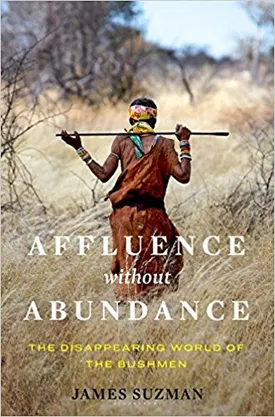James Suzman
James Suzman is a writer, lecturer, and anthropologist devoted to exploring and understanding the unique history of the people in Southern African countries, such as Botswana, where James was born. As a gifted storyteller with a passion for history, his works, like Affluence Without Abundance: The Disappearing World of the Bushmen, have made him a sought-after public speaker and lecturer who championed indigenous rights and has achieved widespread recognition in the field of anthropology, as well as in the popular press.
Throughout his work, James Suzman has been a passionate advocate for the rights of indigenous people in both the past and the present. His book, Affluence Without Abundance: The Disappearing World of the Bushmen, was inspired by his fieldwork among the San people of Botswana’s Kalahari region, who are often referred to as the “Bushmen”. His experience with the San people and his exploration of their unique culture and ways of life have been the foundation for much of his work, which dives deep into the complexities of their past, and sheds light on the challenges they face with living in the rapidly changing landscape of modern-day Botswana.
In Affluence Without Abundance, James Suzman tells the story of the San people and their centuries-old way of life, which is rapidly vanishing due to a barrage of challenges, including modernization, encroachment of development, and competing demands for natural and water resources. His gripping narrative paints a vivid picture of a disappearing world, and speaks to the struggles faced by the people of the Kalahari region in the face of a changing landscape.
To demonstrate the impact of modernization and environmental pressures on the San people, James Suzman narrates two interrelated stories: one of the elegant and resilient Bushmen of the Kalahari, and another of the political and economic forces behind the transformation of their lives. He includes extensive interviews with leaders of various tribes, as well as experts in anthropology, geology, and ecology, to provide a comprehensive and nuanced look at the situation in Botswana.
The depth of Suzman’s writing is also reflected in his other works such as ‘Work, Culture, and Identity: Migrant Labourers in Mozambique and South Africa, 1900-1970’ and ‘Helping Africa Help Itself’. In his book ‘Work, Culture, and Identity’, James Suzman delves into the changing dynamics of labour migration, exploring the development of cross-cultural identities among the workers who travelled between Mozambique and South Africa. In his other work, ‘Helping Africa Help Itself’, James Suzman takes a look at the impact of foreign aid on African economies, and considers how best to help in a way that benefits the local communities.
Beyond his many books, James Suzman has also written for numerous magazines, newspapers and journals, including The Economist and The Guardian, and is a regular contributor to The New York Times and BBC Radio 4. His work has been featured in countless outlets, including the BBC, The Guardian, National Geographic, and The Economist.
Throughout his career, James Suzman has espoused a highly nuanced and compassionate perspective on the cultures of Southern African people and their history. He brings expertise and empathy to his powerful stories and studies, exploring the difficulties they face while remaining attuned to their remarkable resilience and humanity. As a sought-after public speaker and lecturer, James Suzman continues to spread his work and advocacy to global audiences, ensuring that the stories of Southern African people and their history remain heard and respected.

